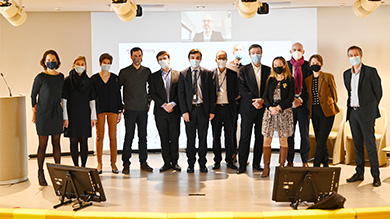Véronique Henaff held management roles in both marketing and sales, primarily in the high tech industry. She has been a certified corporate coach for more than 15 years and particularly focuses on company coaching. She is the founder and manager of coaching firm AVANTILT.
n your view, what is the key challenge in employees’ return to the office?
Véronique Henaff pour NatixisVéronique Henaff: We can do a lot of our work remotely, and sometimes even better than in the office. However, we cannot build in a solid and sustainable way without connections, without strong and authentic communications.
Community is vital for companies and for finding meaning in what we do: companies are first and foremost communities of people.
We have talked a lot about resilience recently, and very rightly so. Resilience is also based on community, and this is why getting back to the office is a key step. However, it does not just happen and there needs to be both preparation and support, as our community will definitely have been affected by this period of lockdown.
Is it not better to let things just settle gradually and naturally?
V.H.: This situation has already lasted for several weeks and in a lot of companies remote working will probably continue for several more months. This distancing will leave its mark.
We all experienced lockdown, but we did not all experience the situation in the same way.
It is a bit simplistic, but we can basically identify three types of experiences: firstly, those who had their work reduced or were furloughed, and were faced with feelings of uselessness or low self-esteem, secondly those who were very connected and called on, and who worked remotely often with a very high “mental load”, and lastly those on the front line or on the ground, who managed the crisis as best they could, sometimes well and sometimes with greater difficulty.
This fragmentation of the social fabric in our companies is entirely unprecedented. It will lead to different ways of returning to the workplace, and reconnecting with others.
If these different experiences are not understood and managed, they could lead to divides between groups as they seek to compare each other, identify and stand out from each other.
We need to take a collective approach to rebuild our community, and we must not underestimate the power of communication and of sharing our experiences.
Véronique Henaff
The fact that virtually everyone stayed in lockdown may perhaps build a sort of solidarity, empathy or attention to others …
Natixis Accueil Covid-19V.H.: This is indeed possible and it is something we should definitely promote. A lot of staff seem to be concerned about returning to work, which is legitimate overall. We have lost our bearings and formed new habits: we are a bit like recovering patients.
It would be a mistake to ignore this and act like nothing happened. It is important to initiate dialogue, take time to organize discussion and communication, encourage staff to talk about their experiences and their feelings, especially if they are negative, and also to express their expectations and aspirations for the future.
We need to take a collective approach to rebuild our community, and we must not underestimate the power of communication and of sharing our experiences. We need processes to support collective rebound momentum: these do not involve action plans, but time spent together in order to rebuild and recreate our connections to find a shared meaning in this period and then look to the future together.
Can something positive some out of this situation?
V.H.: It can and a lot of positive aspects are emerging. The care and attention to others that took root during this period can now provide a new, solid and practiced aspect of management; new relationships were built or strengthened that can change the power lines in our organizations; unexpected leadership qualities emerged for some people.
These are all positive aspects, and during this post-lockdown period we must draw on and encourage all this before the momentum fades. It would be a shame to lose this opportunity to sustainably transform our practices, habits and mindsets. This crisis is also an amazing opportunity.
 Véronique Henaff
Véronique Henaff














